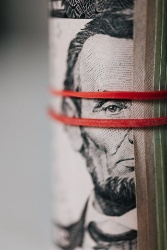Study Raises Concern Over International Trade In Python Skin
27 November 2012
Study
Raises Concern Over International Trade In Python
Skins
Gland,
Switzerland, 27 November 2012 – A new study finds
that close to half a million python skins are reported as
exported annually from South-East Asia. The main importer is
the European fashion and leather industry. The study raises
concerns over the illegality in parts of the trade, animal
welfare issues and the trade’s impact on the conservation
of python populations.
The report, Trade in South-East Asian Python Skins, was launched today by the International Trade Centre (ITC), in co-operation with the International Union for the Conservation of Nature (IUCN) and TRAFFIC, a joint programme of IUCN and WWF. It reveals that the trade in python skins is worth an estimated US $1 billion annually.
“The report shows that problems of illegality persist in the trade in python skins and that this can threaten species’ survival,” says Alexander Kasterine, Head of ITC’s Trade and Environment Programme. “The fashion and leather industry has a stronger role to play in supporting the Convention on International Trade in Endangered Species of Wild Flora and Fauna (CITES) and the developing countries to ensure supply is legal and sustainable.”
Indonesia, Malaysia and Viet Nam are the main sources of exports of python skins, with European Union countries – in particular Italy, Germany and France – the biggest importers. Around 70% of all python skins are re-exported via Singapore. The report notes that a lack of transparency concerning undisclosed stockpiles in the country could be facilitating the laundering of illegally sourced skins.
“It would appear a substantial proportion of the skins in trade are sourced illegally from wild animals, beyond agreed quotas, and using false permits to launder the skins,” says Tomas Waller, Chair of IUCN’s Boa and Python Specialist Group (BPSG).
“With potentially large mark-ups along the supply chain, there is a strong financial incentive for illegal trade in python skins and considerable scope for traders to issue false permits,” says Olivier Caillabet, Programme Officer with TRAFFIC in South-East Asia, and a co-author of the report.
Although more than 20% of exports of Reticulated Python skins from South-East Asia (mainly Viet Nam and Lao PDR) are declared as captive-bred, the report argues that the “commercial case is not convincing and needs to be specifically assessed”, noting that the cost of breeding, feeding and maintaining the snakes to reach slaughter size appears much higher than the market price.
The report recommends that the fashion industry implements a traceability system to demonstrate to consumers that its sourcing is legal and sustainable. This would complement the existing CITES permitting system to allow identification of skins along the length of the supply chain.
An additional concern regards the possible lack of sustainability of sourcing. Large numbers of wild pythons are slaughtered before they reach the reproductive stage, meaning harvest quotas may have been set at unsustainable levels. The report recommends a precautionary approach is applied to harvesting, with legally binding minimum skin size limits to ensure protection of immature snakes.
The report highlights previously unknown slaughter methods, yet argues that trade bans are not an effective or fair way to address illegality and animal welfare issues.
The report was funded by the Government of Denmark, through ITC’s Trade and Environment Programme.
The report can be downloaded from http://www.intracen.org/The-Trade-in-South-East-Asian-Python-Skin/
About ITC
ITC, the
International Trade Centre, is the joint agency of WTO and
the United Nations and is devoted to helping small and
medium enterprises in developing countries become more
competitive in global markets and thus to speed up
sustainable economic development and contribute to the
achievement of the Millennium Development Goals.
About TRAFFIC
TRAFFIC, the wildlife
trade monitoring network, works to ensure that trade in wild
plants and animals is not a threat to the conservation of
nature. TRAFFIC is a joint programme of IUCN and WWF.
About IUCN
IUCN, International Union
for Conservation of Nature, helps the world find pragmatic
solutions to our most pressing environment and development
challenges. IUCN’s work focuses on valuing and conserving
nature, ensuring effective and equitable governance of its
use, and deploying nature-based solutions to global
challenges in climate, food and development. IUCN supports
scientific research, manages field projects all over the
world, and brings governments, NGOs, the UN and companies
together to develop policy, laws and best practice. IUCN is
the world’s oldest and largest global environmental
organization, with more than 1,200 government and NGO
members and almost 11,000 volunteer experts in some 160
countries. IUCN’s work is supported by over 1,000 staff in
45 offices and hundreds of partners in public, NGO and
private sectors around the world. www.iucn.org; IUCN
on
Facebook; IUCN on Twitter
ENDS


 Amnesty International Aotearoa NZ: Global - Recorded Executions Highest Since 2015
Amnesty International Aotearoa NZ: Global - Recorded Executions Highest Since 2015 Save The Children: MYANMAR - Heavy Rains Heighten Risk Of Disease Outbreaks Following Earthquake
Save The Children: MYANMAR - Heavy Rains Heighten Risk Of Disease Outbreaks Following Earthquake UNICEF Aotearoa NZ: Aid Cuts Threaten Fragile Progress In Ending Maternal Deaths, UN Agencies Warn
UNICEF Aotearoa NZ: Aid Cuts Threaten Fragile Progress In Ending Maternal Deaths, UN Agencies Warn Médecins Sans Frontières: Concern Over Planned Deportation Of Afghan Refugees In Pakistan
Médecins Sans Frontières: Concern Over Planned Deportation Of Afghan Refugees In Pakistan European Cultural Centre: Time Space Existence 2025 - A Collective Call To Repair, Regenerate, And Reuse
European Cultural Centre: Time Space Existence 2025 - A Collective Call To Repair, Regenerate, And Reuse John P. Ruehl, IMI: What Will Tech Moguls Do With Their Wealth?
John P. Ruehl, IMI: What Will Tech Moguls Do With Their Wealth?